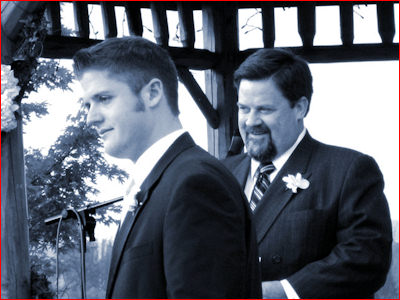
More on the Fad-Driven® Church
Part II of a series
(First posted 20 July 2005)

 n the book Tony Campolo co-authored with Brian McLaren (Adventures In Missing the Point: How the Culture-Controlled Church Neutered the Gospel) Campolo seems to suggest that seminarians ought to pay more attention to marketing techniques and less attention to theology, exegesis, original languages, and other traditional seminary curricula. After all, those are academic subjects with limited practical significance, and pastors these days hardly ever use such stuff after seminary. In Campolo's own words:
n the book Tony Campolo co-authored with Brian McLaren (Adventures In Missing the Point: How the Culture-Controlled Church Neutered the Gospel) Campolo seems to suggest that seminarians ought to pay more attention to marketing techniques and less attention to theology, exegesis, original languages, and other traditional seminary curricula. After all, those are academic subjects with limited practical significance, and pastors these days hardly ever use such stuff after seminary. In Campolo's own words:What if the credits eaten up by subjects seminarians seldom if ever use after graduation were instead devoted to more subjects they will actually need in churches—like business and marketing courses? It is not true that with a gifted preacher, a church will inevitably grow. Good sermons may get visitors to stay once they come, but getting folks to come in the first place may take some marketing expertise.
It was a marketing degree, not an M. Div., that Bill Hybels had when he launched the tiny fellowship that would one day be Willow Creek Community Church. It's not that Hybels is a theological lightweight, contrary to some critics. His sermons are biblically sound and brilliantly relevant to the needs of his congregation—and the relevance comes not from giftedness or theological discernment, but from thoughtfully studying his congregation. As any good marketer would, Hybels deliberately surveys his people with questionnaires in order to determine what they worry about, what their needs are, what's important to them. . . . Then he schedules what subjects he will preach on in the coming year, and circulates the schedule to those on his team responsible for music and drama in the services.
The result is preaching that is utterly biblical and acutely relevant. But the process isn't something you'll learn in most seminaries. Maybe it's time that some business school courses find their way into seminary.
I don't know where Tony Campolo has been for the past twenty-five years or so, but if that advice sounds the least bit fresh or novel to you, you haven't been paying attention to the drift of the church growth movement and its influence in seminaries over the past three decades. What Campolo is suggesting is precisely what many evangelical seminaries started doing some twenty years ago.
Pastors these days are thoroughly indoctrinated with the notion that they must regard their people as consumers. Religion is carefully packaged to appeal to the consumers' demands. There are even marketing agencies that specialize in church marketing. (Typical slogan: "Changing the Way the World Looks at Christians.") There are seminars for church leaders who want to learn how to "brand" their churches as a marketing strategy.
This stuff is everywhere. Fad-driven® pastors can even buy prepackaged, market-tested sermon ideas or whole sermon series. ("New fall message series designs!" now available.)
Church leaders these days are obsessed with image, opinion polls, public relations, salesmanship, merchandising, and customer satisfaction. They have been taught and encouraged to think that way by virtually every popular program of the past two decades.
It has been nearly twenty years since George Barna published Marketing the Church. In that book, he proposed this then-revolutionary notion: "The audience, not the message, is sovereign." That is the basic idea that underlies every Fad-Driven® church. And it's a notion that thousands of pastors and church leaders have uncritically imbibed—and it has been parroted in virtually every major book on church leadership up through and including The Purpose-Driven Church. The audience is sovereign. Their "felt needs" should shape the preacher's message. Opinion polls and listener response become barometers that tell the preacher what to preach. That's what Barna was calling for back in 1988. He wrote,
If [we are] going to stop people in the midst of hectic schedules and cause them to think about what we're saying, our message has to be adapted to the needs of the audience. When we produce advertising that is based on the take-it-or-leave-it proposition, rather than on a sensitivity and response to people's needs, people will invariably reject our message.
Compare that with the words of the apostle Paul, who said, "The time will come when they will not endure sound doctrine, but according to their own desires, because they have itching ears, they will heap up for themselves teachers; and they will turn their ears away from the truth, and be turned aside to fables" (2 Timothy 4:2-5).
What was Paul's point? Do you think he would have agreed with Barna, who said we must adapt our message to the preferences of the audience, or risk having them reject the message?
I think not. Here's what the apostle actually did say to Timothy: "But you . . . fulfill your ministry." "Preach the word! . . . in season and out of season. Convince, rebuke, exhort, with all longsuffering and teaching."
That is what pastors are called to do—not ape the fads and fashions of our culture. Not even to follow the silly parade of evangelical fads. I'm convinced that those who do not get back to the business of preaching the Bible will soon see their churches shrivel and die—because, after all, the Word of God is the only message that has the power to give spiritual life.
And, frankly, the death of the fad-driven churches will be a good thing in the long term. It's something I hope I live long enough to see.








 'll be speaking next
'll be speaking next 
 Yesterday, however, I preached on Ephesians 5:3-7, which is one of those passages that forbids filthiness, foolishness, and crude jokes. I'm thinking about blogging on that subject next month or thereabouts. Get some steel-toed work boots, and get ready for a long comment-thread. When
Yesterday, however, I preached on Ephesians 5:3-7, which is one of those passages that forbids filthiness, foolishness, and crude jokes. I'm thinking about blogging on that subject next month or thereabouts. Get some steel-toed work boots, and get ready for a long comment-thread. When 
 ith the wild popularity of so many evangelical fads like "Forty Days of Purpose"; the lucrative success of the Christian publishing and contemporary Christian music industries; the growing influence of the "emerging church" phenomenon; and a recent cover story by Time magazine featuring
ith the wild popularity of so many evangelical fads like "Forty Days of Purpose"; the lucrative success of the Christian publishing and contemporary Christian music industries; the growing influence of the "emerging church" phenomenon; and a recent cover story by Time magazine featuring  Think about it: Luther was provoked by Tetzel, the charlatan fund-raiser who went through Europe promising people indulgences in return for money so that the Pope could build St. Peter's Basilica in the Vatican. We've got at least a dozen Tetzels appearing daily on TBN, promising people material prosperity in exchange for money. Jan Crouch uses that money to make the sets of the TBN studios more garish and more gaudy than any room in the Vatican, and she has added so many tawdry pink hair extensions to her hairdo that it now rivals the size of the dome on St. Peter's.
Think about it: Luther was provoked by Tetzel, the charlatan fund-raiser who went through Europe promising people indulgences in return for money so that the Pope could build St. Peter's Basilica in the Vatican. We've got at least a dozen Tetzels appearing daily on TBN, promising people material prosperity in exchange for money. Jan Crouch uses that money to make the sets of the TBN studios more garish and more gaudy than any room in the Vatican, and she has added so many tawdry pink hair extensions to her hairdo that it now rivals the size of the dome on St. Peter's. The Medieval church produced Niccolò Machiavelli, the cynical and unscrupulous political theorist who believed the end always justifies the means. We've got a host of evangelical celebrities with shady reputations, from Gary Ezzo to Benny Hinn. We've also got a thousand church-growth "experts" who insist pragmatism is the only workable philosophy for the church today, and that we will never "reach" this generation until we first study which way the winds of popular culture are blowing and follow along.
The Medieval church produced Niccolò Machiavelli, the cynical and unscrupulous political theorist who believed the end always justifies the means. We've got a host of evangelical celebrities with shady reputations, from Gary Ezzo to Benny Hinn. We've also got a thousand church-growth "experts" who insist pragmatism is the only workable philosophy for the church today, and that we will never "reach" this generation until we first study which way the winds of popular culture are blowing and follow along.
 eceivers will beguile the weak; some have been turned aside by [post]modern doubt; and positive infidelity has its partisans. They begin cautiously by reading works with a view to answer scientific or
eceivers will beguile the weak; some have been turned aside by [post]modern doubt; and positive infidelity has its partisans. They begin cautiously by reading works with a view to answer scientific or  intellectual scepticism. They read a little more, and dive a little deeper into the turbid stream, because they feel well able to stand against the insidious influence. They go on, till at last they are staggered. They do not repair to them who could help them out, but they continue to flounder on till, at last, they have lost their footing, and he that said he was a believer has ended in stark atheism, discrediting even the evidence of the existence of God.
intellectual scepticism. They read a little more, and dive a little deeper into the turbid stream, because they feel well able to stand against the insidious influence. They go on, till at last they are staggered. They do not repair to them who could help them out, but they continue to flounder on till, at last, they have lost their footing, and he that said he was a believer has ended in stark atheism, discrediting even the evidence of the existence of God.









 I spent all day yesterday (Wednesday [9 November 2005]) in an orientation seminar with
I spent all day yesterday (Wednesday [9 November 2005]) in an orientation seminar with  Incidentally, when he was a little kid, Pecadillo was the least literate of all our sons. He hated every minute of school. He struggled with learning how to read. His two elder brothers loved Sesame Street and learned the alphabet and basic reading skills before entering kindergarten. Pecadillo's tastes ran to the Three Stooges, and he didn't read anything voluntarily until late Junior High, when someone gave him a biography of Curly. He was the least likely person in our family to blog. He started his blog quietly, without even mentioning it to me, while Darlene and I were out of town a few months ago. I have been amazed by his latent literary abilities. It took me completely by surprise. I honestly don't know when and where he developed his writing skills, but—wow.
Incidentally, when he was a little kid, Pecadillo was the least literate of all our sons. He hated every minute of school. He struggled with learning how to read. His two elder brothers loved Sesame Street and learned the alphabet and basic reading skills before entering kindergarten. Pecadillo's tastes ran to the Three Stooges, and he didn't read anything voluntarily until late Junior High, when someone gave him a biography of Curly. He was the least likely person in our family to blog. He started his blog quietly, without even mentioning it to me, while Darlene and I were out of town a few months ago. I have been amazed by his latent literary abilities. It took me completely by surprise. I honestly don't know when and where he developed his writing skills, but—wow.  hough I rejoice in sudden conversions, I entertain grave suspicions of those suddenly happy people who seem never to have sorrowed over their sin. I am afraid that those who come by their religion so very lightly often lose it quite as lightly. Saul of Tarsus was converted on a sudden, but no man ever went through a greater horror of darkness than he did before Ananias came to him with the words of comfort.
hough I rejoice in sudden conversions, I entertain grave suspicions of those suddenly happy people who seem never to have sorrowed over their sin. I am afraid that those who come by their religion so very lightly often lose it quite as lightly. Saul of Tarsus was converted on a sudden, but no man ever went through a greater horror of darkness than he did before Ananias came to him with the words of comfort. I like deep ploughing. Top-soil skimming is poor work; the tearing of the soil under surface is greatly needed. After all, the most lasting Christians appear to be those who have seen their inward disease to be very deeply seated and loathsome, and after awhile have been led to see the glory of the healing hand of the Lord Jesus as he stretches it out in the gospel.
I like deep ploughing. Top-soil skimming is poor work; the tearing of the soil under surface is greatly needed. After all, the most lasting Christians appear to be those who have seen their inward disease to be very deeply seated and loathsome, and after awhile have been led to see the glory of the healing hand of the Lord Jesus as he stretches it out in the gospel. by Frank Turk
by Frank Turk So:
So: [4] When we are doing our job in the church, as the church, our methods of political engagement will change. It’s ironic, I think, that the church has been able to historically manage the highest rate of change and the highest value of social change when it is most willing to die for the Gospel rather than fight for political ends with political means.
[4] When we are doing our job in the church, as the church, our methods of political engagement will change. It’s ironic, I think, that the church has been able to historically manage the highest rate of change and the highest value of social change when it is most willing to die for the Gospel rather than fight for political ends with political means.





























